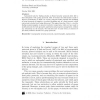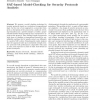115
click to vote
JAR
2006
15 years 2 months ago
2006
Automated tools for finding attacks on flawed security protocols often fail to quately with group protocols. This is because the abstractions made to improve performance on fixed ...
110
click to vote
JLP
2008
15 years 2 months ago
2008
In the analysis of security protocols, methods and tools for reasoning about protocol behaviors have been quite effective. We aim to expand the scope of those methods and tools. W...
115
click to vote
IPL
2006
15 years 2 months ago
2006
We present complexity results for the verification of security protocols. Since the perfect cryptography assumption is unrealistic for cryptographic primitives with visible algebr...
111
click to vote
IJISEC
2008
15 years 2 months ago
2008
We present a model checking technique for security protocols based on a reduction to propositional logic. At the core of our approach is a procedure that, given a description of th...
125
click to vote
CORR
2006
Springer
15 years 2 months ago
2006
Springer
Logics for security protocol analysis require the formalization of an adversary model that specifies the capabilities of adversaries. A common model is the Dolev-Yao model, which c...
101
Voted
CORR
2006
Springer
15 years 2 months ago
2006
Springer
Knowledge flow analysis offers a simple and flexible way to find flaws in security protocols. A protocol is described by a collection of rules constraining the propagation of know...
102
click to vote
IANDC
2008
15 years 2 months ago
2008
Automatic security protocol analysis is currently feasible only for small protocols. Since larger protocols quite often are composed of many small protocols, compositional analysi...
94
Voted
ENTCS
2008
15 years 2 months ago
2008
In the context of Dolev-Yao style analysis of security protocols, we consider the capability of an intruder to dynamically choose and assign names to agents. This capability has b...
110
click to vote
CORR
2008
Springer
15 years 2 months ago
2008
Springer
We present a new technique for verifying correspondences in security protocols. In particular, correspondences can be used to formalize authentication. Our technique is fully auto...
147
click to vote
SAM
2004
15 years 3 months ago
2004
We propose a partial order reduction for model checking security protocols for the secrecy property. Based on this reduction we develop an automatic tool that can check security pr...


